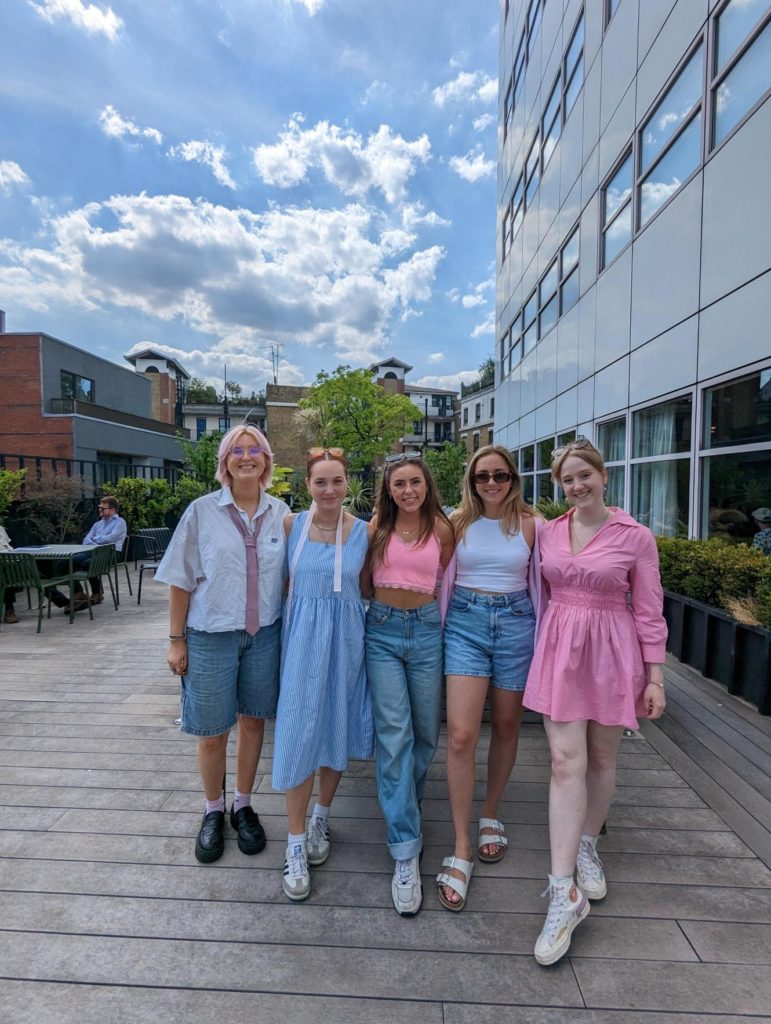“Violence thrives on silence.”
Trans activist Rio Amani opened a seminar I attended on Trans Allyship in the workplace with this impactful statement. Whilst it may sound like a bleak start to a blog about Pride, our current social climate has shown us that, even 53 years after the first march, Pride still has an important role to play.
For the fourth year running, the UK has fallen down ILGA – Europe’s rainbow ranking, which ranks European countries on the basis of their legal and political situation for LGBTQ+ people. Moving from 10th in 2021, to 14th in 2022 and sitting at 17th for 2023, this ranking is a bleak reminder of the difficult realities of being LGBTQIA+ right now.
As a member of the LGBTQIA+ community, I’ve found the recent years increasingly tough. Look at the news most days, and you’ll see stories about shrinking rights and people facing discrimination, abuse, and even death. It’s upsetting for anyone – but for many of us, it’s our life.
It’s also why vocal support matters so much.
In light of this, our DEI committee asked the question, “What can we do to make sure we continue to show support beyond Pride month?” We have a Belonging Commitment that ensures we create a safe space for every employee, client and partner, but we know it’s a constant evolution. To learn more about how we could do better, we attended WorkPride, a global Pride event which focuses on how companies can help the LGBTQIA+ community be safe in the workplace.
Education is integral
One of the key takeaways from this event was how integral education is for inclusion. This can come in many forms, such as engaging with educational and inclusive tv programmes, bringing in speakers, reading books, and more. Education is one of our Belonging Commitment pillars – our Book Club has just read ‘We Have Always Been Here’ by Samra Habib, a memoir which discusses the author’s experience of being a queer muslim. As well as that, our Film Club watched Pride!, which looks at when the queer and mining communities joined forces to protest against laws brought in by Margaret Thatcher. We come together to talk about the themes, our takeaways and what we’ve learnt.
It’s a good starting point, but the modules from WorkPride gave us more specific ways that we can actively encourage education in the workplace.
The first was an elearning module which tracks how far along employees are in their allyship journey, with categories ranging from ‘learner’ to ‘activist’. The second focused on reverse mentoring, with the aim of encouraging education around LGBTQIA+ issues by pairing senior members of staff with more junior members, usually from the LGBTQIA+ community, or another minority group.
The aim of reverse mentoring is to break down workplace hierarchies by allowing the senior staff member to be in the position of learning. This vulnerability and openness helps create a safe space where the needs of a minority community can be heard by someone who holds the power to implement change – an important step in creating true inclusive leadership. It’s given us real food for thought, and we’re going to explore how we might bring a reverse mentoring programme to our agency.
The importance of allyship
Whilst these modules usefully demonstrated how we can ensure our workplace is more inclusive, it was the modules on allyship that really stayed with us. One, on trans allyship, opened with a remembrance of the trans lives that have been lost to anti-trans violence this year. It was a sobering memorial that reminded us of the terrifying realities that this community faces every day
It may have begun on a serious note, but the session was a crash course on how to become an active ally with a memorable acronym:
Acknowledge
Recognise that every community faces different struggles – and the only way to truly understand is to listen to them.
Learn
Take this opportunity to educate yourself – there is so much information out there in many different forms – books, music, film, podcasts, the list goes on.
Level Up
Leveling up is about evening social inequity. Raise up those from communities that have been disproportionately affected by discrimination to give them opportunities that they otherwise may have been excluded from.
whY
This is a chance to reflect – what did you learn by being an ally, whether this be through education, speaking out or otherwise. Did this benefit the community? If it didn’t, that’s okay. All you have to do is learn from this experience and try again.
We were left with a quote that struck a chord with all attendees:
“If you’re not standing close enough to a marginalized group to be hit by the rocks thrown at them, you are not standing close enough”.
We felt that this quote rang true for what allyship is all about. It’s about standing together and using your shields to protect those without any – especially important when those people are under attack.
Typically, during Pride Month, corporations throw up a rainbow logo, and call themselves allies. This ‘rainbow washing’ ignores the realities that members of the LGBTQIA+ community still face today. Nelson Bostock has committed to being better. As a company, we recognise that we are not perfect, but we are committed to continual improvement, and will try as hard as we can to support all of our staff – even when the rainbow logos come down.


